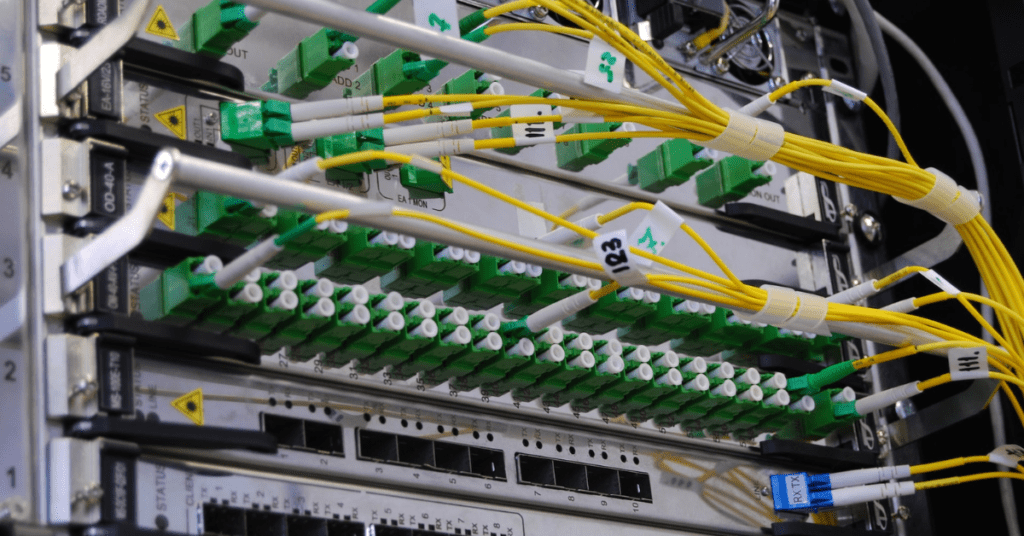Have you been wondering how many jobs are available in telecommunications equipment? Well working with this type of technology can be an exciting and rewarding experience. With advancements and improvements to communications networks comes increased demand for specialists who understand the intricacies of telecommunications equipment.
There are currently 195,800 jobs available in telecommunications equipment in the US.
This blog post will look closely at the number of available jobs in the industry and determine which sectors offer positions most frequently. We will also provide guidance on what qualifications prospective employees should possess if they wish to pursue a career in this field. By the end of this article, you should have greater clarity regarding your prospects when it comes to careers in telecommunications equipment.
- Is Telecommunications Equipment a Good Career Path?
- Best Paying Jobs in Telecommunications Equipment
- How Big is the Telecommunication Industry?
- What is the Job Outlook for Careers Within Telecommunications?
- 3 Biggest Telecommunications Companies
- Types of Jobs in Telecommunications Equipment
- Qualifications Required for Professionals in Telecommunications Equipment
- Salary Expectations in the Telecommunications Field
- Resources and Training Opportunities
- Benefits of Working in the Telecommunications Industry
- FAQs
- Conclusion
Is Telecommunications Equipment a Good Career Path?
A career in telecommunications equipment could be an excellent fit for individuals with both technical knowledge and strong interpersonal skills. Telecommunications is a rapidly evolving industry and therefore requires professionals with a thorough awareness of the latest developments and an ability to communicate in diverse team settings effectively.
With its vast growth potential, this field offers competitive pay and the potential to work with cutting-edge technology, making it an attractive career path. Individuals with performance-driven and creative mindsets, who can readily take on unpredictable challenges and new opportunities, should consider entering this promising field.
Best Paying Jobs in Telecommunications Equipment
Telecommunications equipment installers and repairers are among the highest-paying jobs in the telecommunications industry. These occupations earn a median annual salary of more than $62,000. The job duties involve installing, maintaining, and repairing equipment used for communication forms like internet services and television systems. With the proper skill set and educational qualifications, candidates can further enhance their earning potential by working independently with established companies or taking on larger projects. For those passionate about communications technology, this occupation provides an excellent avenue for career growth, financial stability, and satisfying work.


How Big is the Telecommunication Industry?
The telecommunications industry is growing, boasting more than $1.6 trillion in revenue globally in 2018. It continues to evolve daily as consumers demand faster and more reliable services such as internet access, television content, and mobile networks.
As technology advances and new players enter the industry, measuring its size is increasingly difficult. Countries with poor broadband coverage or infrastructure may distort overall figures, suggesting larger facilities than there are. Furthermore, defining a telecommunication service provider is difficult since different countries have different sets of regulations for providers that may bundle multiple activities together. Despite this complexity, the telecommunication industry will remain an important part of the economy due to its continuous advancements toward providing better communication services worldwide.
What is the Job Outlook for Careers Within Telecommunications?
Telecommunications careers are experiencing positive growth based on Bureau of Labor Statistics projections. Particularly, jobs such as network and computer systems administrators, database administrators, and software developers are projected to grow 8% over the next decade. This job outlook is better than most other professions in the technology industry due to continual advancements in the sector, which have led to increased demand for new talent. The influx of new professionals into the industry will allow for further innovation to meet corporations’ demands across industries. As technology expands and influences numerous facets of life, telecommunications professionals will be at the forefront of pioneering these ever-evolving roles.
3 Biggest Telecommunications Companies
The US telecommunications industry is immense, with the three biggest companies dominating the market. AT&T, Verizon, and T-Mobile have been at the forefront of providing telecom services to citizens across the country. These companies have enabled users to connect from anywhere easily through their services, such as voice, data, and in video services.


As such, these companies hold significant influence in the industry, making them the most influential players in this field today. Their success has resulted in an unrivaled capability to provide various communication solutions regardless of geographic location or user population size. It is no wonder they continue to be the top three telecommunications providers in the United States.
Types of Jobs in Telecommunications Equipment
Installation and Maintenance Professionals
Installation and maintenance professionals play an important role in the telecommunications equipment industry. They are responsible for setting up and maintaining communication networks, such as cell phone towers and other communications infrastructure. They install and troubleshoot new systems and ensure that existing systems work correctly.
In addition, they upgrade outdated equipment, maintain records of system performance, and ensure compliance with safety standards. Installation and maintenance professionals must have a good understanding of electronics, strong troubleshooting skills, and the ability to work quickly in sometimes challenging conditions.


Network Engineers
A network engineer is another type of job role in the telecommunications equipment industry. They develop and maintain communications networks, such as those used for cell phones, landlines, cable TV, and broadband internet. They configure network hardware and software to meet customer requirements and design solutions that improve communication reliability and speed.
Network engineers also troubleshoot any issues with existing networks or devices, perform regular maintenance on systems to ensure proper performance and security of data. They also install fiber optics or cabling when needed, and stay up-to-date on technological advances that may affect the industry.
Wireless Communications Specialists
Wireless communications specialists are specialized professionals in the telecommunication equipment industry, responsible for planning, installing, and optimizing wireless communication networks such as radio waves, Bluetooth technology, and infrared signals.
Their activities go beyond troubleshooting issues on existing systems. They may design future-oriented protocols to upgrade current networks or install antennas, base stations, and related hardware abiding by local regulations while understanding cellular communications protocols.
Telecommunication Technicians
Telecommunications technicians are integral to the telecommunications equipment industry, maintaining and operating its various networks. Their expertise spans from installing new hardware or software for customer needs to testing, troubleshooting, and repairing analog systems and digital components. Such issues involve VoIP, Ethernet technologies like DSL, and Wi-Fi up to advanced cable modems or cellular data transmissions. Therefore they must comprehensively understand how all of these diverse communication methods interact to provide reliable service at customers’ disposal.


Sales and Marketing Professionals
Sales and marketing professionals play a vital role in the telecommunications equipment industry, as they are responsible for developing strategic marketing plans to identify new product opportunities. To do so effectively, these professionals need an intimate understanding of the market trends within their field and the technology behind their own company’s products. This knowledge base enables them to craft compelling sales presentations, create marketing materials highlighting product value, and develop pricing structures that capitalize on existing customer data insights.
Qualifications Required for Professionals in Telecommunications Equipment
Educational Requirements
To work in the telecommunications equipment industry, many employers require educational qualifications such as an associate’s degree or higher in electrical engineering, computer science, physics, mathematics, or another related field. Many telecommunication technicians also need certifications related to the specialized hardware and software they use.
Sales and marketing professionals typically need a Bachelor’s Degree in communications, public relations, marketing, or business administration. Additionally, sales and marketing professionals should understand the technology used in this industry.
Technical Certifications
Technical certifications are highly valued in the telecommunications equipment industry. For technicians, this can include qualifications such as Certified Telecommunications Network Specialist (CTNS), Wireless Technician Certification (WTC), and Voice Over Internet Protocol (VoIP). For sales and marketing professionals, certifications may include Certified Telecommunications Sales Professional (CTSP) or Certified Wireless Network Administrator (CWNA). These technical certifications demonstrate a comprehensive understanding of the technologies used in this industry and help applicants stand out from other job seekers.
Industry Recognized Credentials
Obtaining industry-recognized credentials can give applicants a competitive edge in the telecommunications equipment sector. Well-known certifications from vendors and associations such as Cisco Certified Network Associate (CCNA), Telecommunications Industry Association (TIA), National Equipment Providers Association (NEPA), and Wireless Broadband Alliance (WBA) are highly sought after, while some employers may look favorably upon an applicant has obtained a certification from an academic institution like a university or college.


Showcasing these qualifications demonstrates knowledge of relevant technologies in this field – setting apart job seekers with far-reaching expertise for employment consideration within the industry landscape.
Salary Expectations in the Telecommunications Field
Pay rates in the telecommunications equipment industry vary depending on several factors, including job role and experience. Entry-level positions such as technicians and field engineers can earn an average of $35,000 – $45,000 USD a year. For more experienced professionals in roles such as systems administrators or project managers, the pay can range from $50,000 to over $100,000 USD per year.
Professionals with experience in the telecommunications equipment industry can typically command higher salary rates than those without. Those with specialized certifications and several years of experience in the field can command salaries over $80,000- $150,000 USD per year. Those with certifications or previous experience may start at a lower base salary, but they can expect their salary to increase as they gain experience and take on greater responsibility. Some employers also offer bonuses and other performance-based incentives for experienced professionals.
Resources and Training Opportunities
Several invaluable resources are available for those interested in developing their telecommunications career. The Institute of Electrical and Electronics Engineers (IEEE) provides specialized courses on network engineering, software development, and Big Data analysis. Telecommunications companies also offer certifications and training to keep employees up-to-date with the ever-changing industry standards. Other valuable sources include online communities, such as Stack Overflow. They provide helpful tips along with regional meetups for exchanging ideas among professionals in a local setting, or webinars that allow individuals to gain knowledge without needing to leave home.
Benefits of Working in the Telecommunications Industry
Professionals in the telecommunications industry are presented with many advantages, including working with cutting-edge technology and gaining customer experience and project management skills. Companies often provide competitive salaries and other attractive offers for those who stay informed about market developments, such as flexible hours and access to new information regarding their sector.
FAQs
What are the most common telecommunications equipment jobs?
The most common jobs in the telecommunications equipment industry include technicians, field engineers, systems administrators, project managers, software developers, and network engineers. These professionals are responsible for various tasks, including installing and maintaining equipment, troubleshooting technical issues, developing software applications, managing projects and networks, and providing end-user training.
What are the most challenging telecommunications equipment jobs?
The most challenging jobs in the telecommunications equipment industry usually require specialized knowledge and experience. These may include roles such as network architects, software developers, or project managers. In these positions, professionals must deeply understand how to design, build, and maintain complex networks and systems. Additionally, they may need to stay up-to-date on new technology trends and developments to provide effective solutions for their organization’s needs.
What are the major trends in telecommunications equipment?
The major trends affecting the telecommunications equipment industry include the rise of 5G technology, cloud-based services, IoT (Internet of Things) integration, Big Data analytics, and artificial intelligence (AI). These technologies are how businesses operate by increasing connectivity and allowing for more efficient changing processes. Additionally, they are enabling new customer experience opportunities such as personalized marketing and customer service.
What are the challenges facing the telecommunications equipment industry?
The telecommunications equipment industry is currently facing several challenges. These include increased competition as new players enter the market, the need to keep up with rapid technological advancements and the challenge of creating new products that are reliable and cost-effective. Additionally, companies must deal with the ever-changing regulatory environment to remain compliant and avoid costly fines or penalties.
Conclusion
The telecommunications industry is an ever-evolving landscape, offering many job opportunities. From network engineers and software developers to Big Data analysts and AI application developers, the range of potential career paths reflects both traditional roles and newer fields created by this dynamic sector. Companies are searching for employees with expertise in customer experience, project management, business development, and marketing. All of which can stay abreast of current developments, such as 5G technology or cloud services, allowing them to remain competitive within their marketplace.
It’s no secret that the telecommunications industry is booming. As our reliance on technology grows, so makes the demand for qualified workers to maintain and improve upon existing systems. If you’re looking for a career with plenty of room for growth and advancement, telecommunications equipment may be the right field. With an expected 4% increase in job availability over the next decade, now is a great time to enter the market. Do you have what it takes to succeed in this rapidly-growing industry?

